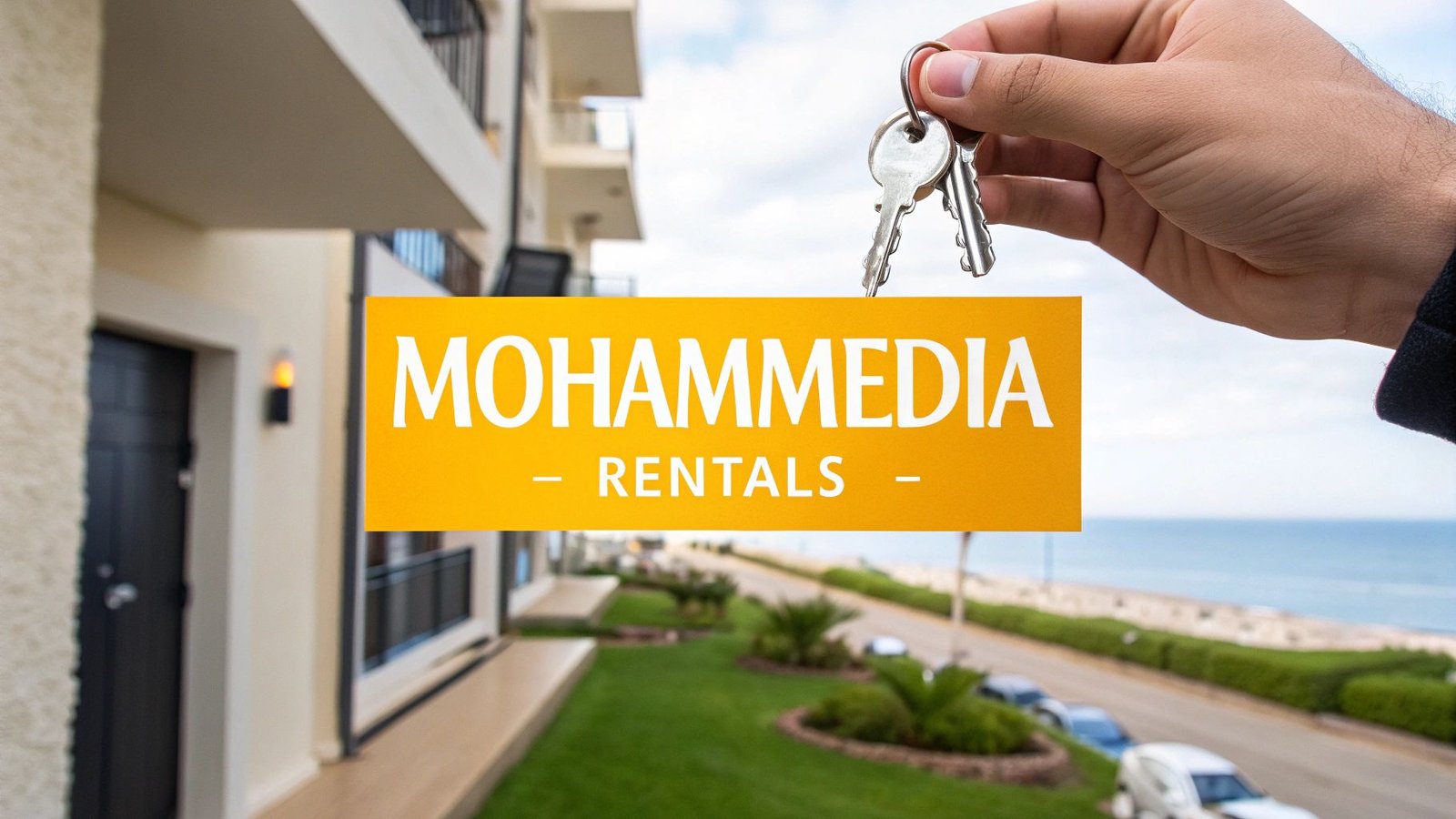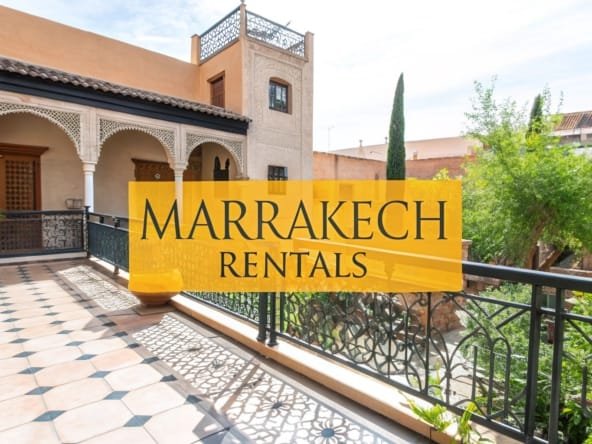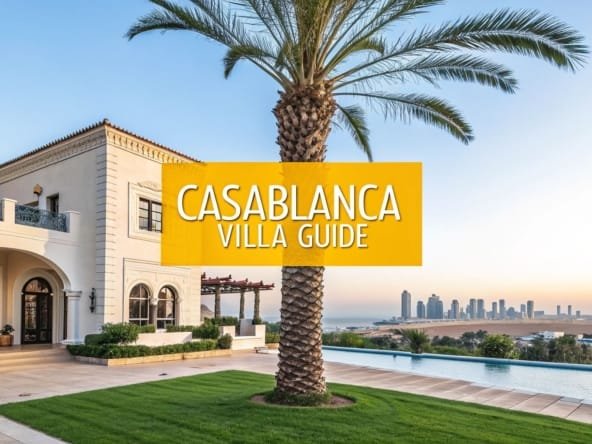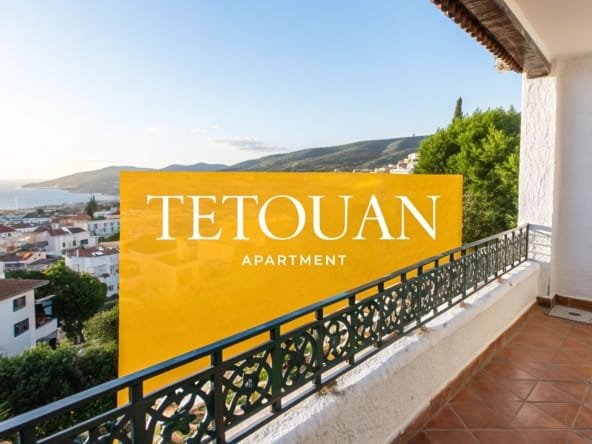Before you even start scrolling through listings, it’s crucial to get your head around the Mohammedia rental market. This isn't Casablanca or Rabat. Mohammedia has its own unique flavour—a blend of relaxed coastal living with the convenience of a major city right next door. This dual personality really shapes the kinds of apartments you'll find and what you can expect to pay.
Understanding this from the get-go is your best advantage. It helps you set a realistic budget and makes the entire search process far less frustrating.
Getting to Know the Mohammedia Rental Scene
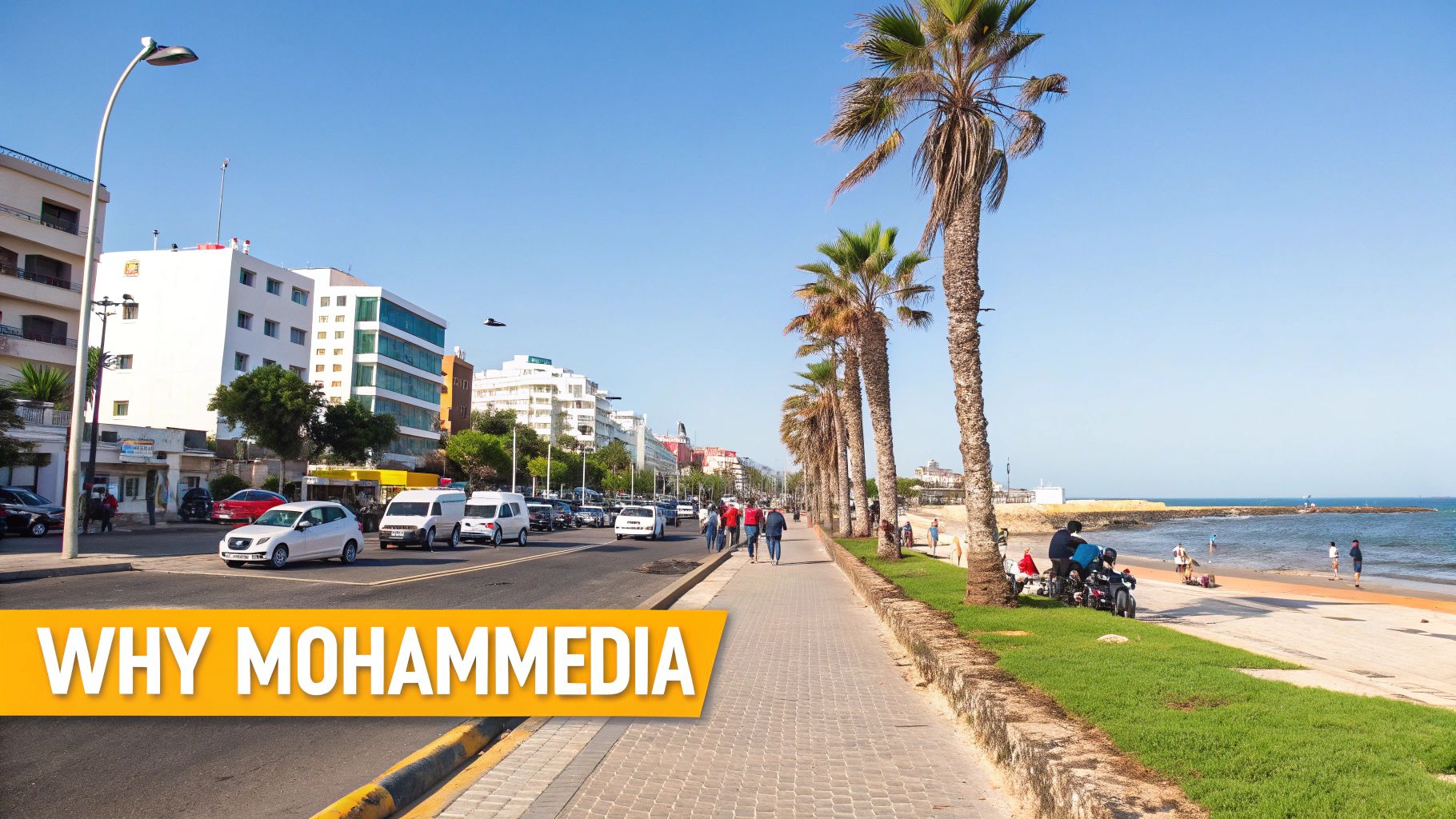
So, what does a search for a location appartement Mohammedia longue durée actually look like on the ground? You’ll see a wide spectrum of options. There are the sleek, modern apartments in new coastal developments, and then you have the more traditional, often larger flats tucked away in the city's established neighbourhoods.
Finding Your Vibe: Property Types and Neighbourhoods
Mohammedia is a city of distinct zones, and each has its own character. The areas hugging the coastline and the popular Mansouria suburb are, unsurprisingly, in high demand. This is especially true in the summer, which can squeeze the availability and nudge up the prices for long-term lets. Properties here often come with perks like swimming pools, secure parking, and that coveted direct beach access.
Move a little further inland, towards the city centre, and the atmosphere changes. You’ll find a more authentic Moroccan way of life. The apartments here are often older and more spacious, and your dirham will stretch further. The trade-off? You’re closer to the bustling local markets, administrative buildings, and public transport hubs, which can be incredibly practical for day-to-day living.
Here’s something I’ve learned from experience: your location here does more than just determine your view—it dictates your entire lifestyle. Living near the Royal Golf Club, for instance, means a quieter, more upscale environment. On the other hand, an apartment near the central train station offers unbeatable convenience if you're commuting.
It's also worth noting the market's current climate. Morocco's property sector is buzzing, and that's having a direct effect on rentals in coastal cities like Mohammedia. Two and three-bedroom flats, which make up a massive 66% of buyer searches, are seeing annual price bumps between 4% and 7%. This is fuelled by strong demand from both local families and professionals, a 55% increase in foreign investment, and new infrastructure projects.
What does this mean for you? It means you need to be decisive. When you find the right place at a fair price, be ready to act. You can get more detailed insights on these trends from resources like Sands of Wealth's Moroccan property forecasts.
Quick Look at Mohammedia Rental Costs (Estimates)
To give you a clearer picture, here’s a rough breakdown of what you might expect to pay per month. These are just estimates, of course, and prices will fluctuate based on the specific building, its age, and amenities.
| Apartment Type | Average Unfurnished Rent (MAD) | Average Furnished Rent (MAD) | Key Considerations |
|---|---|---|---|
| Studio / 1-Bedroom | 3,500 – 5,000 | 5,000 – 7,000 | Ideal for singles or couples. Furnished is often preferred for convenience. |
| 2-Bedroom | 5,000 – 8,000 | 7,000 – 10,000 | Most common type. Great for small families or professionals needing an office. |
| 3+ Bedroom / Villa | 8,000 – 15,000+ | 12,000 – 20,000+ | Found in premium areas like Mansouria. The price jump is significant. |
As you can see, the choice between furnished and unfurnished has a major impact on your monthly budget, often creating a 15% to 20% price difference.
Furnished vs. Unfurnished: The Big Debate
This is one of the first major decisions you'll face: go for a furnished (meublé) apartment or an unfurnished (vide) one? The right answer depends entirely on your situation.
- Furnished Apartments: These are the definition of "move-in ready." You walk in, and everything is there—from the sofa and bed right down to the kitchen utensils. They’re a fantastic option for expats, people on fixed-term contracts, or anyone who just wants to avoid the hassle of setting up a home from scratch. You pay a premium for that convenience, though.
- Unfurnished Apartments: This is your blank canvas. The rent is lower, but you have to factor in the upfront cost and effort of buying furniture, appliances, and everything else. For anyone planning to stay for a few years, this route is almost always more economical in the long run and lets you put your own stamp on the place.
Getting these fundamentals down is the first real step to a successful apartment hunt. It sets you up to match your expectations with the reality of the market, letting you focus your search on the neighbourhoods and properties that truly fit your needs for a long-term home in Mohammedia.
How to Find Your Ideal Mohammedia Apartment
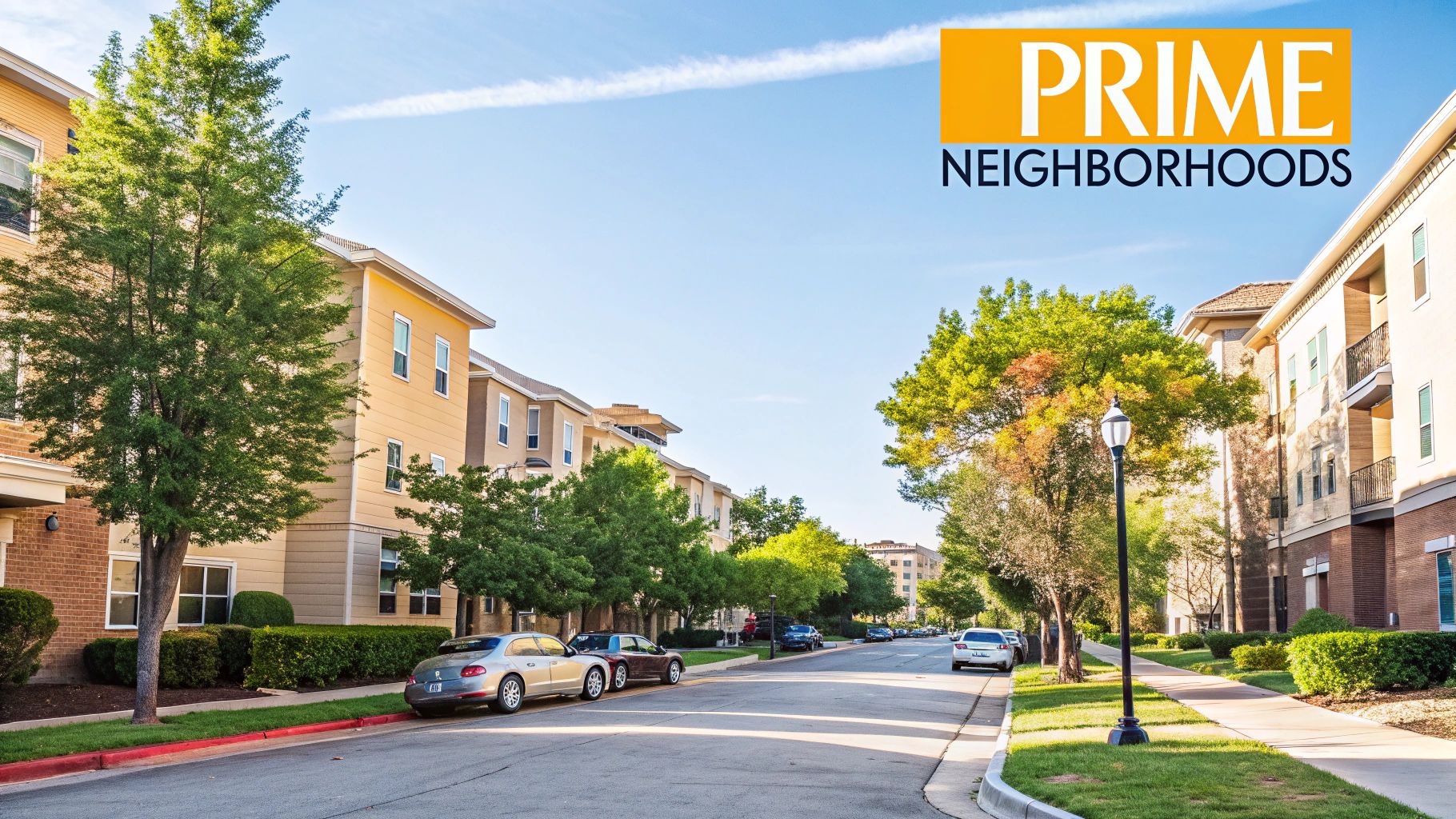
Finding the right location appartement mohammedia longue durée isn't about luck; it's about strategy. Simply scrolling through listings will only get you so far and often leads to frustration. The real key is to blend modern, digital tools with the kind of on-the-ground networking that has defined the Moroccan property scene for generations.
Think of it as a two-pronged attack. You'll start online to get a lay of the land, but you'll close the deal by tapping into local expertise.
Mastering Online Property Portals
Your search will almost certainly begin online. The Moroccan digital property market is largely dominated by a few key players, and getting to know them well will give you a serious advantage. Portals like Mubawab and Avito.ma are the heavyweights, with thousands of listings posted by both agencies and private landlords.
Don't just be a passive browser. Become a power user.
- Filter Aggressively: Go beyond the basics like "2 bedrooms." Pinpoint your exact neighbourhood (Mansouria, Le Centre-Ville), specify if you need it furnished, and set a firm maximum budget.
- Create Alerts: The best apartments—the ones that are well-priced and in great locations—are often gone in a matter of days, sometimes even hours. Set up instant email or phone notifications for your specific search criteria. This ensures you're among the first to reach out.
These platforms are also fantastic for your own market research. By watching listings for a couple of weeks, you'll develop a sharp sense of current rental prices in different parts of the city.
A crucial pro-tip: always check the date a listing was posted. If an apartment has been sitting online for over a month, there's usually a reason. It could be overpriced, have some hidden drawbacks, or the owner may not be in a rush. Focus your energy on the newest listings for the best results.
The Essential Role of the Local 'Samsar'
As powerful as online portals are, they don't show you the full picture. Many of the most desirable long-term rentals in Mohammedia are never advertised online. This hidden market is controlled by the samsar—the local, independent real estate agent.
A good samsar is your most valuable ally. They have deep roots in the community and hear about available properties long before they're officially listed. You can find them in small offices all over the city, but the best way is often just to ask local shop owners or your building's gardien for a recommendation.
When you connect with one, be crystal clear about your needs and your budget. The more precise you are, the better they can help you, saving everyone's time. Their fee, which is usually one month's rent split between the landlord and tenant, is well worth it for the exclusive access and time saved.
Uncovering Hidden Gems Offline
Beyond the samsar, some of the best apartments are found through simple, old-fashioned word of mouth. This is where you can find a truly great location appartement mohammedia longue durée at a price that feels fair.
Don't be afraid to put the word out.
- Social Media: Look for Facebook groups like "Expats in Mohammedia" or "Location Appartement Casablanca & Mohammedia." You'll often find landlords posting directly to avoid agency fees.
- Notice Boards: It might seem old-school, but check the bulletin boards in local supermarkets, community centres, and even near mosques.
- Just Talk to People: This is Morocco, after all. Let the concierge (gardien), local café owners, and other residents know you're looking for a place. You'd be surprised how often a casual chat can lead to a fantastic lead.
By combining the broad reach of digital platforms with the insider knowledge from local connections, you ensure no stone is left unturned. This comprehensive approach is the most effective way to navigate the market. And for those with an eye on property as an asset, our guide to investing in Morocco real estate offers a deeper look into the market's potential.
Getting a Real Feel: Inspecting and Vetting Potential Apartments
So, the photos look great, the location seems perfect, and the price is in your budget. Excellent. Now for the most important part of your search for a location appartement mohammedia longue durée: the in-person viewing. This is where you trade the polished online listing for the unfiltered reality of the space.
Don't underestimate this step. A thorough inspection is your best defence against months, or even years, of headaches and unexpected costs. It’s easy to get swept up in the excitement of a promising flat, but you need to go in with a detective's mindset.
Looking Past the Fresh Paint: The Structural Checklist
When you walk through the door, your first job is to assess the apartment's bones. The core systems and structural integrity are what truly define your daily life in a home. In a coastal city like Mohammedia, dampness is a constant battle, so you need to be especially vigilant.
Here's what to look for:
- Signs of Humidity: Scan the ceilings and walls for any water stains, particularly in corners or behind where large furniture might have been. Check for bubbling or peeling paint and open up wardrobes and kitchen cabinets. A musty smell is a major red flag for mould.
- Water Pressure: Be bold. Turn on every single tap—the kitchen sink, the bathroom faucets, and definitely the shower. Is the flow weak or inconsistent? This can be a daily frustration and might point to bigger plumbing problems in the building.
- The 'Chauffe-Eau' (Water Heater): Find the water heater and give it a good look. Is it gas or electric? Does it look ancient, rusty, or show any signs of leaking? Ask about its age and when it was last serviced. A dodgy chauffe-eau isn't just an inconvenience; it can be a serious safety risk.
- Electrical System: Count the outlets. Are there enough for your life, or will you be living in a jungle of extension cords? Take a peek at the fuse box. Does it look modern and properly labelled, or like a relic from another era?
Think of these as the non-negotiables. An apartment can have stunning views, but if it’s plagued by dampness or has a failing water heater, that initial charm will wear off very, very quickly.
My best advice? You’re not just a visitor; you're an investigator for the next 30 minutes. Open every cupboard, look under the sinks, flick every switch. What you find in this short window will shape your living experience for the next year or more.
This infographic gives you a clear way to see how your budget breaks down, moving from the base rent to utilities and other costs.
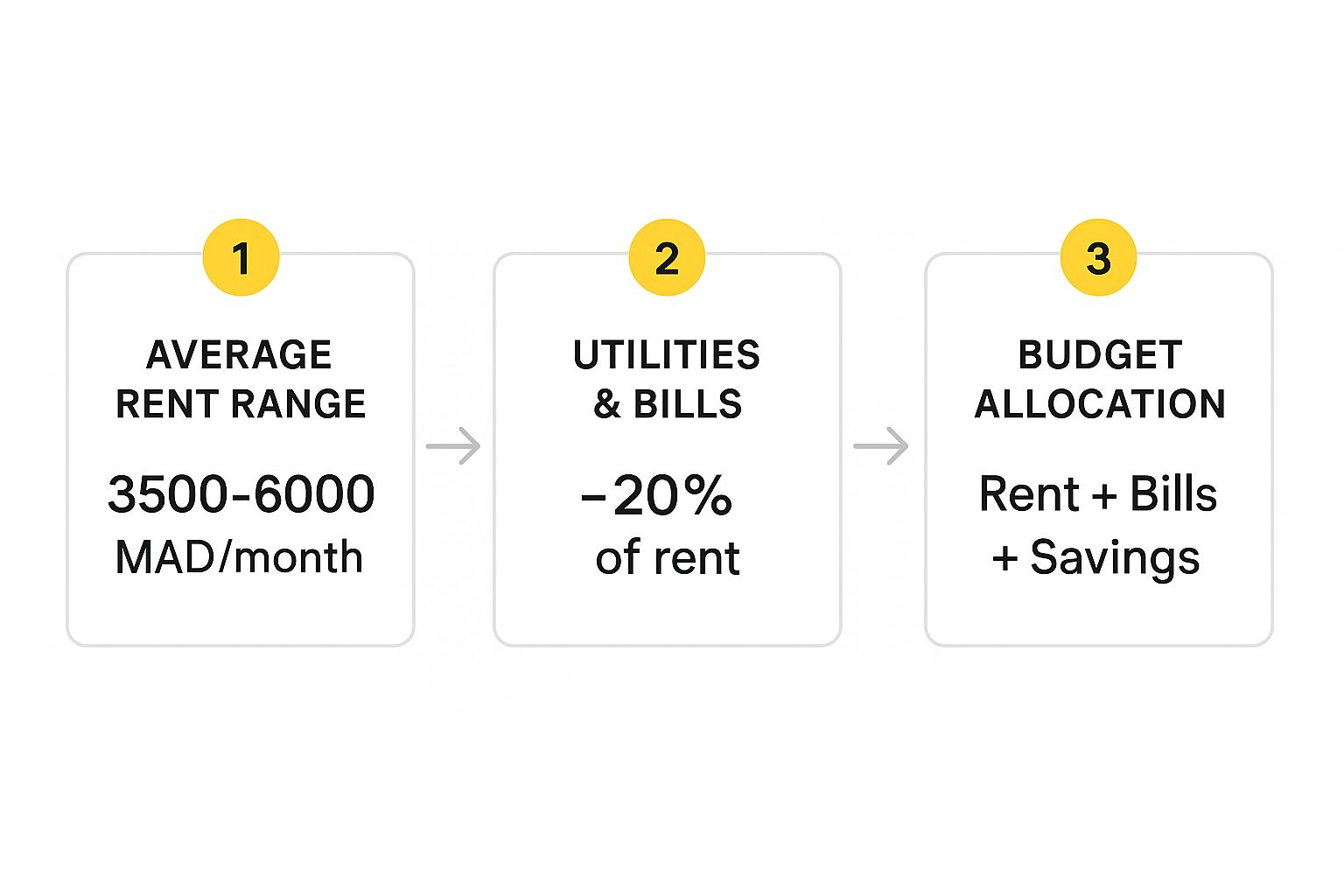
Mapping out your budget like this is a great way to confirm if an apartment's rent truly fits your finances, saving you from any nasty surprises down the line.
Beyond Your Front Door: The Building and Neighbourhood Vibe
An apartment is only one piece of the puzzle. The building it's in and the neighbourhood surrounding it are just as crucial to your happiness. Your inspection needs to go beyond the unit itself.
If you can, try to schedule viewings at different times. A street that's quiet on a Tuesday morning could be a noisy hub of activity on a Friday night, thanks to a nearby café or heavy traffic. Pay attention to noise from neighbours, construction, and the street below.
Next, turn your attention to the building's shared spaces.
- Common Areas: How are the stairwells, lobby, and elevators maintained? A clean and tidy common area is often a good sign of a well-managed building.
- Security: Is there a gardien (concierge or security guard)? Does the main entrance feel secure? These features are vital for your peace of mind.
- Amenities: If the building boasts a pool or parking, check them out. Is the pool clean and functional? Is the parking spot assigned, and is it easy to get in and out of?
Asking the Right Questions to Get the Real Answers
The viewing is your prime opportunity to get information you won't find in any online ad. Go in with a list of smart questions. The answers you get will tell you a lot about the property and the person managing it.
Key Questions for the Landlord or Agent
Here’s a practical table to guide your conversation.
| Category | Questions to Ask | Why It's Important |
|---|---|---|
| Costs & Fees | "What's the typical monthly syndic fee?" "Are there any other building charges I should know about?" | Syndic fees cover building upkeep and can add a significant chunk to your monthly bills. You need to budget for them. |
| Building Rules | "Can I review the 'règlement de copropriété' (building rules)?" "Are there rules on pets, noise, or guests?" | Knowing the building's internal regulations is key to avoiding future disagreements with neighbours or the management. |
| History & Community | "Why did the last tenant decide to move?" "What is the building community like?" | The answers, even if diplomatic, can hint at potential issues with the flat or the neighbours. |
By being methodical and asking direct questions, you turn a simple tour into a proper investigation. This diligence is what ensures your chosen location appartement mohammedia longue durée becomes a genuine home, not just a temporary address.
Navigating Lease Agreements and Negotiations
You’ve found the apartment. Now for the moment that turns you from a hopeful viewer into a resident: the lease agreement. In Morocco, this document is called a bail de location, and it’s the legal foundation of your entire tenancy. Thinking of it as just a formality is a rookie mistake—it's a binding contract that spells out every right and responsibility for both you and the landlord.
Rushing this part or glossing over clauses you don't fully understand can create serious headaches later. The same focus you brought to your apartment hunt is needed here. This is your chance to make sure everything is clear, fair, and legally solid, setting the stage for a smooth, stress-free stay.
Deconstructing the Moroccan 'Bail de Location'
The standard Moroccan rental contract, the bail de location, has several core parts you need to go over with a fine-tooth comb. Landlords often use templates, but the details inside can change, and nearly everything is open for discussion.
Keep a sharp eye on these key clauses:
- Lease Duration (Durée du bail): For a location appartement mohammedia longue durée, you’ll typically see a one-year term. The contract has to specify the exact start and end dates. Look for a clause on automatic renewal (reconduction tacite), which means the lease continues unless someone gives notice.
- Rent Payment (Loyer): The document must state the precise monthly rent, the payment due date, and the way you’ll pay (bank transfer is common and provides a good paper trail).
- Security Deposit (Caution): This is usually one or two months' rent. The contract should list the exact amount and explicitly state it will be returned when you leave, minus any costs for damages that go beyond normal wear and tear.
- Termination Conditions (Conditions de résiliation): This part details the notice period (préavis) required to end the lease, for both you and the landlord. The legal standard is often two months, but it's what's written in your contract that counts.
Getting a firm grasp on these elements isn't optional. They are the nuts and bolts of your legal relationship with the property owner.
The Art of Negotiation
While some contract terms might seem set in stone, there's often more wiggle room than you'd expect, especially in a bustling market like Mohammedia. A bit of savvy negotiation can lead to better terms and real savings over your tenancy.
The length of your commitment is your strongest negotiating chip. If you're ready to sign for more than the standard year, some landlords will consider a small discount on the monthly rent. It gives them guaranteed income and saves them the effort of finding a new tenant anytime soon.
But don't get stuck on the rent. You can also discuss other practical points. For instance, if you noticed a room could really use a fresh coat of paint during the viewing, you could suggest the landlord handle it in exchange for you signing the lease without delay.
A key thing to remember is that negotiation is a conversation, not a fight. A polite, reasonable request stands a much better chance of success than an aggressive demand. The aim is to find common ground where both you and the landlord feel you've got a fair deal.
It's also worth noting that rental affordability is on the government's radar. A major study, backed by a 3.5 million dirham budget, was launched to analyse and improve the rental market in key cities. By collaborating with real estate agencies and developers, this initiative aims to create more affordable housing options, which could help bring price stability for long-term renters. You can read more on this strategic plan to boost affordable rental housing in Morocco's major cities.
Protecting Your Deposit with the 'État des Lieux'
This might be the single most important step for safeguarding your security deposit: the état des lieux. This inventory and condition report is your primary evidence, and it needs to be done with meticulous attention to detail.
Essentially, the état des lieux is a detailed checklist, signed by both you and the landlord, that records the apartment's exact condition the moment you take possession. It should list every fixture and, if furnished, every item, noting the state of the walls, floors, windows, and appliances.
Here’s how to do it right:
- Be Methodical: Walk through the apartment room by room with the landlord present. Flip every switch, test every tap, open every cabinet, and run the appliances.
- Document Everything with Photos: Your phone is your best friend here. Take clear, dated photos and even short videos of each room. Zoom in on any existing imperfections—a scratch on the floor, a crack in a tile, a scuff on the wall.
- Be Specific in Writing: Vague descriptions won't help you later. Instead of "kitchen in good condition," write "Kitchen countertop has a small chip on the bottom right corner." Instead of "wall is fine," write "Living room south wall freshly painted, no marks."
Once completed and signed, this report is attached to your lease. When you move out, a final inspection, the état des lieux de sortie, is done. By comparing the 'before' and 'after' reports, you have undeniable proof of the apartment's original condition, making it much easier to secure the full return of your caution.
Budgeting for All Your Rental Expenses
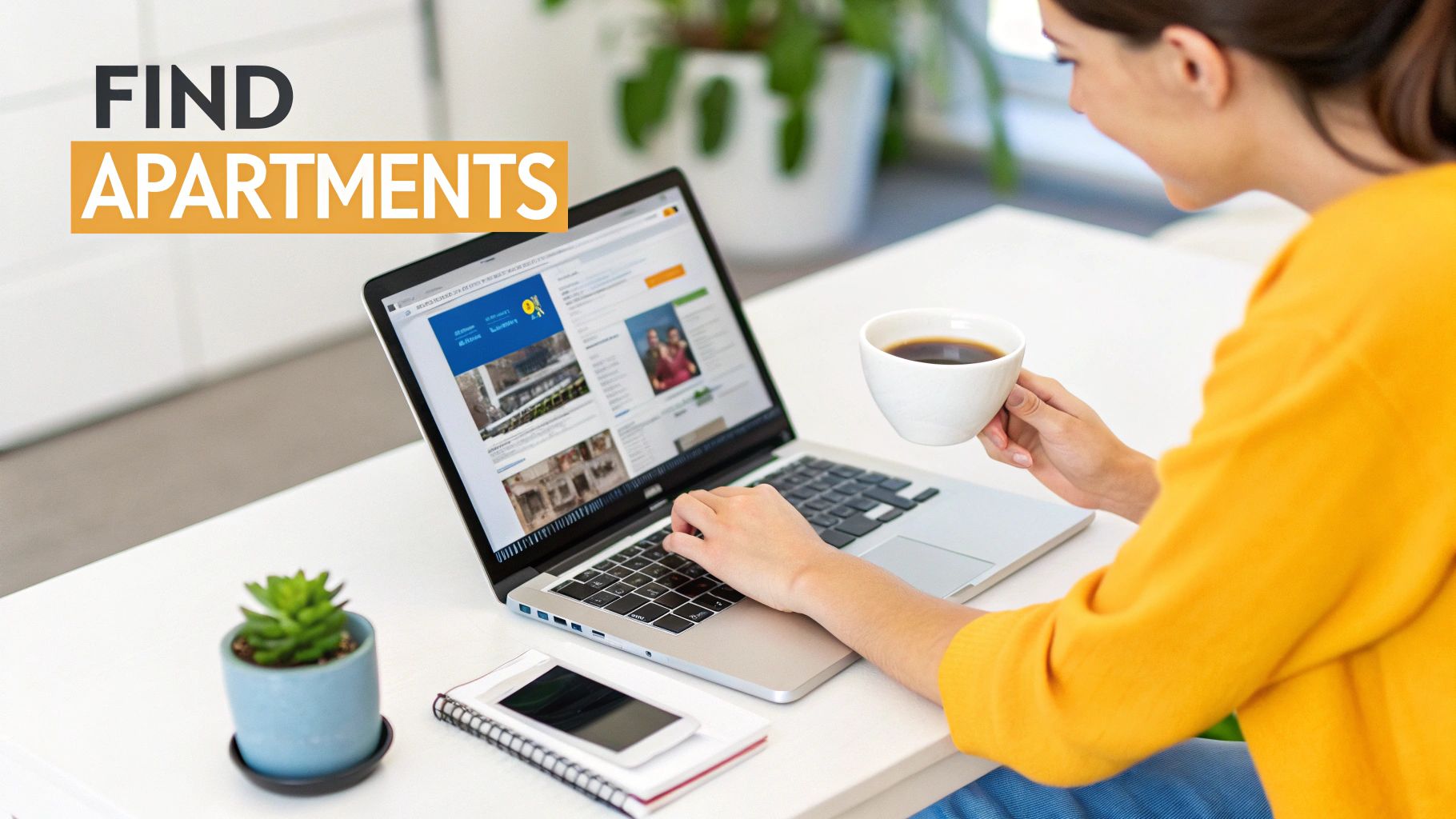
When you're searching for a location appartement mohammedia longue durée, it's easy to focus on the monthly rent advertised. But that figure is just the beginning. To avoid any unwelcome financial surprises down the line, you need to build a budget that accounts for all the other costs that come with running a home in Mohammedia.
These extra expenses can really add up, turning what seemed like a great deal into a source of stress. Getting a clear picture of everything from utilities to annual taxes is what separates a smooth, comfortable tenancy from a difficult one.
Breaking Down Your Monthly Utilities
For most long-term rentals here in Morocco, the tenant is responsible for their own utility bills. The two main ones you'll handle are water and electricity, which are often bundled together by a single regional provider like Lydec.
Once you move in, you'll need to get the accounts switched over to your name. This usually means a trip to their local office with your lease agreement and ID in hand. Your bill is based on what you use, and it's calculated in tiers—the more you consume, the more you pay per unit. That means running the air conditioning all summer can lead to a serious spike in your electricity costs.
You'll also need to sort out internet and mobile services. Providers like Maroc Telecom, Orange, and Inwi have plenty of options for fibre optic and 4G home internet.
- Internet: A reliable, high-speed connection will typically set you back between 250 to 500 MAD a month, depending on the provider and the speed you choose.
- Mobile Plans: For long-term stays, postpaid plans with a good amount of data are almost always a better deal than constantly topping up a prepaid SIM.
These recurring costs are a fundamental part of your budget. For a wider view of these and other day-to-day expenses, take a look at our detailed guide on the cost of living in Morocco, which breaks things down city by city.
Understanding Building and Municipal Fees
Beyond what you use inside your apartment, there are two other key costs to be aware of: the syndic fees and the annual residence tax.
The syndic fee is a monthly charge you pay to the building's management. It covers the upkeep of all the shared spaces, which is essential for a well-maintained building. This fee includes:
- Cleaning of lobbies and stairwells
- Electricity for lights in common areas and for the lifts
- The salary for the gardien (concierge or security guard)
- Maintenance for shared amenities like a pool or garden
This fee can vary quite a bit, from 150 to 500 MAD a month, or even more in high-end buildings with lots of amenities. Before you sign anything, always make sure you ask for the exact syndic amount.
The 'taxe d'habitation' is an annual residence tax collected by the municipality. It's based on the estimated rental value of your apartment and is paid once a year. While you should always clarify with the landlord, the responsibility for paying this tax almost always falls to the tenant.
It can also be helpful to see the market from a landlord's perspective. For instance, data from the short-term rental market shows about 271 active listings in Mohammedia with an average occupancy of 36%. A typical property might bring in a median monthly income of around $577, while the most desirable units can earn over $1,462 during the peak month of August. This kind of information, available on platforms like AirROI.com, really highlights the city's strong rental demand.
By taking a complete inventory of every expense—rent, utilities, syndic, and taxes—you can create a budget that’s realistic and sustainable for your new life in Mohammedia.
Answering Your Lingering Questions About Renting in Mohammedia
Even with a solid plan, a few specific questions always pop up when you're looking for a location appartement Mohammedia longue durée. Getting these details sorted out beforehand is the key to moving forward with confidence. It’s about clarifying those small but crucial points that can make all the difference.
Let's dive into the queries I hear most often from renters just like you.
What’s the Deal with the Security Deposit?
One of the first things people ask about is the security deposit, or caution as it's known locally. How much should you budget for, and what are the rules for getting it back?
In Mohammedia, the standard practice is for landlords to request a deposit equal to one or two months' rent. This isn't just a random number; it's a widely accepted and legally recognised norm that gives the landlord a safety net against any serious damage to their property.
By law, your landlord must return the deposit when your tenancy ends. The only funds they can legally withhold are for damages that exceed normal wear and tear—and those damages must be documented in the état des lieux (inventory report) you both signed at the start.
This is exactly why that initial move-in inspection is so important. A detailed report, complete with photos, becomes your best line of defence for getting your full deposit back.
Can Foreigners Legally Rent Long-Term?
I get this question a lot, especially from expats. The short answer? Absolutely, yes. There are no legal barriers preventing non-Moroccan citizens from signing a long-term rental contract in Morocco.
The process itself is quite straightforward and well-trodden. You'll just need to have a few key documents ready for the landlord or agency.
- A clear copy of your valid passport is non-negotiable.
- Proof of income, like an employment contract, might be requested.
- If you have a Moroccan residence permit (carte de séjour), include a copy of that too.
The legal framework is solid. However, navigating the cultural nuances is just as important. For a deeper dive into the unwritten rules, understanding what they don't tell you about renting in Morocco can save you a lot of headaches.
Who Is Responsible for the Utility Bills?
This is a critical detail to lock down before you put pen to paper. In nearly all long-term leases in Mohammedia, the utility bills are not included in the monthly rent.
This means the responsibility for paying for water and electricity falls to you, the tenant. You'll need to open an account in your name with the local provider, which is typically Lydec for the Casablanca-Settat region. The process is standard—you'll usually just need your signed lease agreement and your ID. Always double-check this with the landlord to avoid any surprises down the road.
At Rich Lion Properties, our goal is to make the real estate journey in Morocco as smooth as possible. Whether you're hunting for a long-term rental in Mohammedia or weighing up an investment, our team is ready to offer the clear, expert guidance you need. See how we can support you by visiting us at https://richlionproperties.com.
